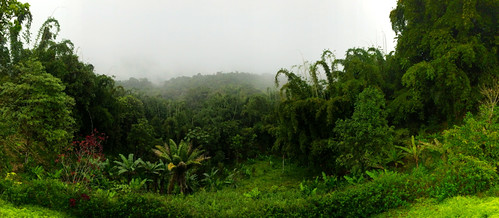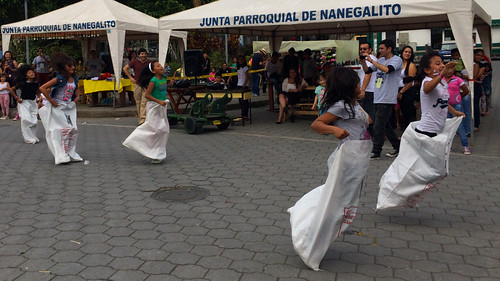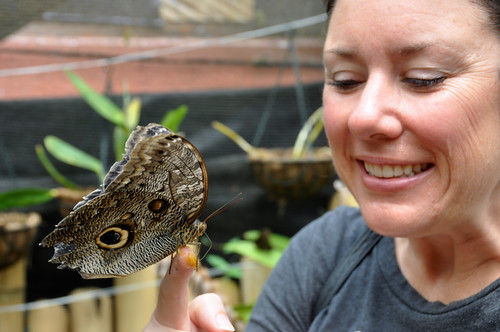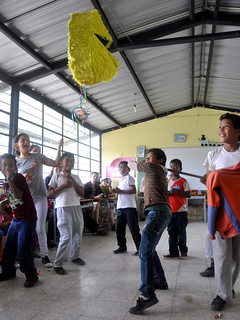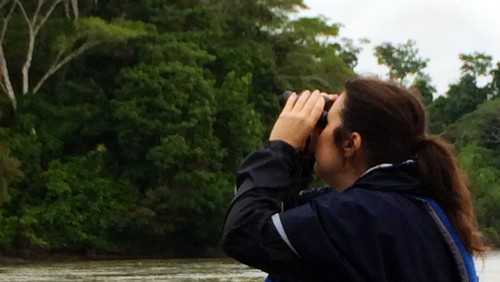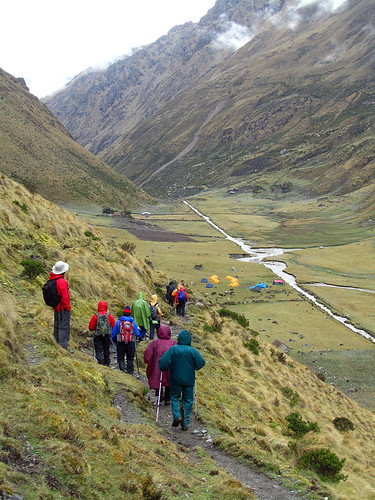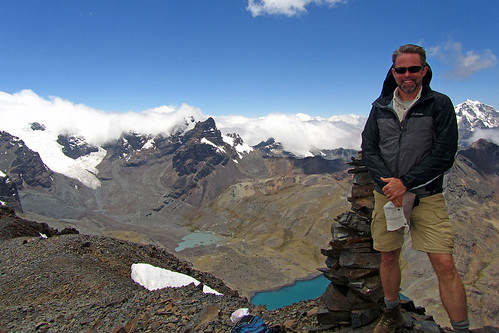Last night, we had our neighbors over for drinks. For three hours, we sat around sipping wine while chatting about life with Jan and Sheila. (Jan is pronounced “yawn”.)
Jan and Sheila are both in their early seventies, about thirty years older than Kim and I are. But whereas some folks their age seem to have resigned themselves to silently fading away, our neighbors are still active and engaged with life.
The couple met about fifteen years ago, soon after Jan’s first wife died. Sheila was recently divorced and happy to find a man who, for once, was a kindred spirit. For a few years, they traveled the world, teaching English in China, exploring Costa Rica, and so on. They still travel regularly. Last summer, for instance, they spent several months in eastern Europe, including a lot of time in rural Poland.
A couple of years ago, Jan and Sheila towed a pop-up camper across the United States, from Oregon to Montana to New Mexico to Texas to Arkansas to North Carolina. They visited seventeen states in three months. In each state, they stopped at a nursing home to interview the residents.
“We asked people to tell us their stories,” Sheila said. “At first, our recordings weren’t very good. In time, we figured out what we were doing. We got better with the equipment and we learned what questions to ask.”
“Interesting,” I said. “Kim and I want to do something similar. In fact, we’re shopping for a used RV right now. We want to use it to make forays across the U.S. and Canada. We plan to interview the folks we meet along the way. But we’re not sure what we’ll talk about.”
“You should have a plan,” Sheila said. “Otherwise the conversations will just wander. We found that the StoryCorps method was a fantastic way to spark discussion. Their website has a list of great interview questions. You should check it out.”
Jan recommended that we try to keep an open mind when we travel, to not set a fixed agenda. “You should eavesdrop,” he said. “You learn a lot about a place when you eavesdrop. You learn what’s important to the people there. You learn about the things going on in the town.”
By eavesdropping in Taos, New Mexico, Jan and Sheila found out about a jam session at a local bar. Because they’re both musicians, they stopped in. They got to hear some amazing performers that they might have otherwise missed. “You haven’t heard of the best musicians in this country,” Jan explained. “Often the best musicians don’t have recording contracts. They’re not pretty enough for the stage. Or they never wanted to be famous. You find them in out-of-the-way places like Taos.”
“I’m happy that you two are traveling now while you’re young,” Sheila said. “Travel isn’t as easy as it used to be. For whatever reason, this last trip to Poland was especially hard. The language barrier was hard. Airport transfers were hard. It’s the first time I’ve really felt old while traveling.”
We spent a long time talking about aging, about intergenerational connections. Kim noted that although she’s in her mid-forties, she loves learning from both people who are younger and people who are older than she is. “I feel like there’s something to learn from everyone if we’re willing to listen,” she said.
“That’s true,” Jan said. “I wish more people felt the same way. Mostly folks seem too busy to connect with anyone else. That’s one of the reasons we did our nursing-home trip.”
“Tomorrow night at our wisdom circle, we’re going to talk about stuff like this,” Sheila said. “We’re going to talk about the things you lose as you get older.”
“You mean like family and friends?” asked Kim.
“Like family and friends, but other things too,” Sheila said, motioning to Jan, who wears a hearing aid. “Like hearing. Like flexibility and mobility. Like health, in general.”
“What about connection to culture?” I asked. “It seems to me that as you get older, you might become more and more disconnected from popular culture. The movies and music you loved as a child get buried under a flood of changing taste and fashion.”
“It’s not as bad as you might think,” Jan said. “You don’t care as much anymore. Plus, the things you love are always there. You just have to know where to look for them.”
The conversation moved to money and happiness. Sheila asked me something she’s brought up before: “Why do you think so many people believe money will bring them happiness? Is it what the money represents? Is it something else?”
We talked about people we know and how they handle money. Jan mentioned a friend who’s afraid to spend anything at all. He has plenty of money but can’t bring himself to buy even things that might make him happier. “He could easily afford a new car, but he won’t let himself have it. I think that’s too bad. His money won’t do him any good once he’s gone.”
I noted that some people have the opposite problem: “In my line of work, I’ve heard plenty of stories about folks who have squandered windfalls. Inheritances, the lottery, that sort of thing. A person can be broke, win $100,000 in the lottery, and then be broke again a year later. I think people like this mistakenly believe that money will solve all their problems. But money can’t solve problems. You have to solve them. Happiness comes from inside.”
“That’s true,” Kim said, “but money certainly makes things easier. For me, I feel a whole lot better knowing that I have so much money in savings. If something goes wrong, I have a safety net. Money may not buy happiness but I think that not having money can make people pretty unhappy.”
I described how my pursuit of happiness has changed over time. When I was deep in debt, I thought money was the answer. After I’d repaid my debt, I thought I’d be happy if I had more money. Eventually I realized that money wouldn’t make me happy. I made other changes to my life. Some increased my happiness but most didn’t. In time, I came to understand that in order to be happy, I had to just be myself. I had to be comfortable with who I am, warts and all. And I had to surround myself with friends who were happy with who I am too.
Sheila nodded. “That’s smart,” she said. “A lot of people never realize that. You’re lucky to have figured it out while you’re young.”
I laughed. “I don’t have it all figured out,” I said. “Sometimes I forget everything I’ve learned. Sometimes I find myself doing things to please others or buying things because I think they’ll make me happy. It’s a process.”
“You know what?” Kim said as the night came to a close. “Before our trip, we need to practice our interview skills. Can we interview you two sometime? We’d love to hear your stories.”
“Sure,” said Sheila. “We’d be happy to help.”
“You’ll want to have a good microphone,” Jan said. “Sound is at least fifty percent of the puzzle.”
“Everyone keeps telling us that,” Kim said. “That’s why J.D. bought a fancy microphone.” I went back to my office to retrieve the gear I bought after asking for advice from my friend Tess Vigeland, a long-time reporter for NPR.
“That should do the trick,” Jan said. “You want to be able to record the person you’re talking too without getting the clatter of dishes or the din of the television in the background.”
And so, Kim and I have started the next phase of our adventure together. Last Friday, we spent several hours browsing the Portland RV show. Today we took our first steps toward conducting interviews. Next up? I need to use our new gear — the camera, the lenses, the lights, the microphone — to make some test recordings. Be warned: Over the next few weeks, you might see some more silly videos around here! (If you have requests, let me know.)

